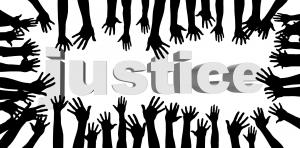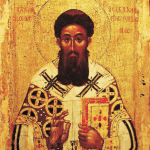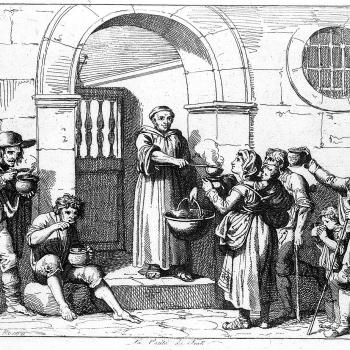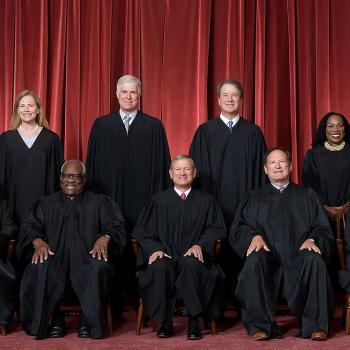
Servant of God, Archbishop Hélder Pessoa Câmara OFS, famously said: “When I give food to the poor, they call me a saint. When I ask why they are poor, they call me a communist.” In doing this, he shows us what happens to those who work for justice. They get called all kinds of names. They are accused of being things they are not. They are given such labels by their critics so that their critics will only have to engage strawmen, while they will then have to defend themselves before promoting their own real agenda. We find so many people are influenced by such scare tactics, which is why they are used. It is difficult for someone to defend themselves from such mislabeling.
The problem which Câmara saw in his day is a problem which not only has not been rectified, but has become much worse. Those who work for and promote justice continue to be called socialists and communists, no matter what perspective they use to promote justice. And this association, of course, is used to condemn any and all forms of social work. We can see this in the way many people react to those working to heal the wound of systematic racism. They are accused of being secret communists trying to destroy society. This is why authentic Critical Race Theory (CRT), which looks at systematic racism, its causes, and what kinds of legal and economic solutions can be used to fix those problems, has become labelled “communist.” This has led to CRT itself as becoming a new label in and of itself, where it is assured to be bad because it is communistic, and so must be rejected and forbidden from being taught in schools. Anyone who is concerned with the history of racism, the impact of racism on society, and the ways to deal with racism are told they cannot teach their concerns in schools. They are not allowed to change the hearts of the young, and the only reason why this is done is to make sure those who are privileged by systematic racism can continue in that privilege.
Social justice is an important element of Christian teaching. It is found in Scriptures, indeed, it is found in the writings of the prophets, and promoted by Jesus himself. He consistently argued against the injustices found in society and those who gained privilege because of them. He spoke out on behalf of the poor, and condemned the rich and other leaders in society who ignored the plight of the people (cf. Lk. 6:20 -26). Throughout the centuries, those who read Scripture carefully noticed this, and would join in with their own condemnation of society for the systematic evils found in them, evils which often centered around the rich and the way they kept their power and wealth out of the hands of the poor and needy. “Through the pride of his riches the rich man rules over other men, whom he can harm, and treats them badly, just as if they were not fellow creatures, and in this way the good name of mankind (that man is the image and likeness of God [cf. Gen 1.26]) is blasphemed.”[1] It is with this understanding that St. Salvian the Presbyter lamented:
Where can you find any one who is not poor, whether actually or by status, who is safe living beside a rich man? By the encroachments of the powerful the weak lose their belongings, or even themselves along with their belongings. Not unrightly does the Holy Word apply to both when it says: ‘the wild ass is the lion’s prey in the desert: so also the poor are devoured by the rich.’ For, not only the poor, but almost the whole human race, is suffering from this tyranny. [2]
Those with wealth and privilege always use it to justify themselves and ignore the plight of those who do not have them, but if they are ever called to task, if they ever lose what wealth and privilege they have, they show how far they are from virtue by the way they want to destroy everything, harming all because they no longer are accorded privileges which were not justly theirs in the first place:
The proud are always taking up cause against the good ones; when prosperity shines on them, boastfully they glory in their own merits, and then they draw away from the afflictions of the good and just; but when adversities come upon them, they are turned quickly to blasphemy by the weakness of their spirit.[3]
How many of the rich, how many of those in positions of privilege, have looked down upon others, saying their position is accorded to them because they have been blessed for their goodness? How many justify the way they treat others by saying others are morally inferior to them? Systematic racism often combines with it this ideology as can be see in the way many who continue to promote it (and outright racism) look down on other races as being inferior. And if anyone responds to them, saying all humans are good and worth of equal dignity and honor, once again, the response is to say such criticism stems from communism and is to be rejected. This is why those who study systematic racism, its causes, and who try to find solutions to it, are condemned as communists and the whole cause, labeled as CRT, is attacked as a communist plot.
Christians should know better. As Câmara indicated, we should ask for the root causes of the problems before us, and when we find them, we must overturn them so as to change the system itself. We must not allow this to work. We must let compassion wrote, as Albert Schweitzer said, “We must never permit the voice of humanity within us to be silenced. It is man’s sympathy with all creatures that first makes him truly a man.”[4] If we are to be what we are called to be, when we see injustices, we will want to right them because we will care about those who have been harmed by them.
“The Church reproves, as foreign to the mind of Christ, any discrimination against men or harassment of them because of their race, color, condition of life, or religion.”[5] Racism is a real issue; it not only continues to be a threat, but the responses given to those who try to work against racism show racists will do all they can to stay in positions of power and privilege. When they lose it, they become destructive; they will not blame themselves for the destruction, but rather those who try to create a more just society. When Christians oppose social justice work, work which includes rejecting and overturning systematic racism, they show themselves acting contrary to the teachings of the Gospel and so are worse off because, as Salvian said, they should be better:
Therefore, for this very reason, Christians are worse because they should be better. They do not practice what they preach, and they struggle against the faith by their morals. All the more blameworthy is evil which the label of goodness accuses, and the holy name Is the crime of an unholy man. [6]
Systematic racism is allowed to continue because the root causes of it, the ideologies and prejudices which created it, continue. We must therefore work to change hearts so that what establishes the system and keeps it in place can be and will be eliminated. This is why racism needs to be talked about in schools. This also means, of course, we not only change the hearts but the system, and so we must look into the laws, see which promote injustice, and eliminate them as well:
Racism will disappear from legal texts only when it dies in people’s hearts. However, there must also be direct action in the legislative field. Wherever discriminatory laws still exist, the citizens who are aware of the perversity of this ideology must assume their responsibilities so that, through democratic processes, legislation will be put in harmony with the moral law. Within a given State, the law must be equal for all citizens without distinction. A dominant group, whether numerically in the majority or minority, can never do as it likes with the basic rights of other groups. It is important for ethnic, linguistic or religious minorities who live within the borders of the same State, to enjoy recognition of the same inalienable rights as other citizens, including the right to live together according to their specific cultural and religious characteristics. Their choice to be integrated into the surrounding culture must be a free one.[7]
And, of course, if we are going to change the system, if we are going to make things just, we must lift up those who have been oppressed:
From the legal point of view, all persons (individual or corporate) have a right to equitable reparation if personally and directly they have suffered injury (material or moral). The duty to make reparation must be fulfilled in an appropriate way. As far as possible, reparation should erase all the consequences of the illicit action and restore things to the way they would most probably be if that action had not occurred. When such a restoration is not possible, reparation should be made through compensation (equivalent reparation). This is the most common form of reparation, but the calculation of the compensation is often difficult. When compensation does not suffice to make reparation for a moral injury, moral reparation can be made, that is satisfaction. An example of this is the offering of an apology or expression of regret to the victim State by the State responsible for the wrong.[8]
Catholic teaching, therefore, works with and promotes authentic Critical Race Theory, when Critical Race Theory is seen as the legalistic enterprise to work for and promote racial justice (and not the misrepresented form of it used to undermine all attempts to promote social justice).
So many people like to use labels as a way to undermine the work for justice. They use such labels for scare tactics. The people they talk to do not know what the labels really mean, and what differentiates those who the labels actually represent and those who are being misidentified by them. And this is done in order to keep things as they are, or worse, to continue reinforce systematic injustice and create further barriers between the privileged and those lacking such privilege. If we are to be disciples of Christ, we cannot accept this. Christ spoke out against the abuse of privilege. We must do so as well.
[1] St. Hildegard of Bingen, “Letter 378” in The Letters of Hildegard of Bingen. Volume III. Trans. Joseph L Baird and Radd K Ehrman (Oxford: Oxford University Press, 2004), 165.
[2] Salvian the Presbyter, “The Governance of God” in The Writings of Salvian the Presbyter. Trans. Jeremiah F. O’Sullivan (Washington, DC: CUA Press, 1962), 97.
[3] St. Isidore of Seville, Sententiae. Trans. Thomas L. Knoebel (New York: Newman Press, 2018),210.
[4] Albert Schweitzer, The Animal World of Albert Schweitzer. Trans. and ed. Charles R. Joy (Boston: Beacon Press, 1950), 177.
[5] Nostra Aetate. Vatican translation. ¶5.
[6] Salvian the Presbyter, “The Governance of God,” 123.
[7] Pontifical Council for Justice and Peace, “The Church and Racism: Towards a More Fraternal Society.” Vatican translation (1988). ¶29.
[8] Pontifical Council for Justice and Peace, “Contribution to World Conference Against Racism. Racial Discrimination, Xenophobia, and Related Intolerance.” Vatican translation. (Aug. 31- Sept 7, 2001). ¶12.
Stay in touch! Like A Little Bit of Nothing on Facebook.
If you liked what you read, please consider sharing it with your friends and family!

















